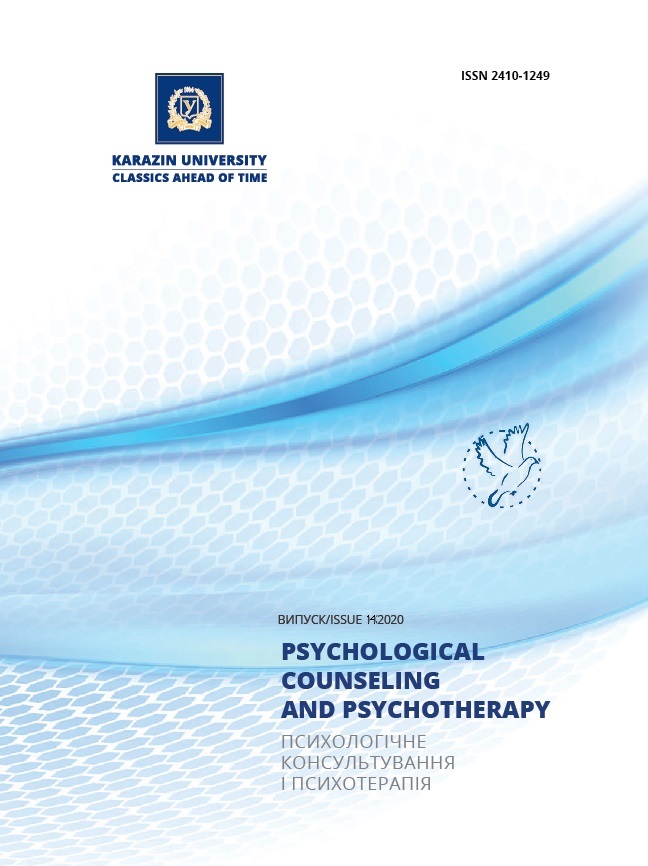At the Forefront of the Buffer: the Convergence of Traditional and Positive Psychology
Abstract
The paper provides a holistic or rather a holographic representation of the evolution of a segment of psychological disciplines in the period of its critical self-organization within a so called VUCA-world (volatile, unpredictable, complex and ambiguous). The basic contradiction between Traditional and Positive Psychology are interpreted in terms of a source of development of a novel sphere of psychological research and practice called by the author Buffer or Transition Psychology. Its content is viewed through dialectical, psycho-immunal and clinical perspective. An original non-deficiency principal is defined and illustrated by a case of a severely traumatized woman: within one session she positively resolutes into a posttraumatic growth condition. The author raises challenging issues which open up promising discussions and practical implications into psychological and social research.
Downloads
References
Bauman, Z. (2010). 44 Letters from the Liquid Modern World. Cambridge.
City of translators. (2007). Pilsudski J., from http://www.trworkshop.net/forum/viewtopic.php?f=66&t=28902
Csikszentmihalyi, M. (2012). FLOW: The Psychology of Optimal Experience.
Davis, R. D., & Millon, T. (1994). Personality change: Metatheories and alternatives. In T. F. Heatherton & J. L. Weinberger (Eds.), Can personality change? (pp. 85 119). American Psychological Association. https://doi.org/10.1037/10143-005
Fassinger, R. E. Shullman, S. L., Buki, L. P. (2017). Future Shock: Counseling Psychology in a VUCA World. Counseling Psychologist, 45(7) 1048–1058, https://doi.org/10.1177/0011000017744645
Fava, G., Guidi, J. (2020). The pursuit of euthymia. Forum The Evolving Science of Euthymia: Concepts, Assessment and Interventions. World Psychiatry. 19(1), 40-50. https://doi.org/10.1002/wps.20698
Greenberg, G. (2010). Inside the Battle to Define Mental Illness from: http://www.wired.com/magazine/2010/12/ff_dsmv/.
Hegel, G. W. F. (1812/1969). Science of Logic (A. V. Miller, Trans.). London: George Allen and Unwin.
Held, B. (2004). The Negative Side of Positive Psychology. Journal of Humanistic Psychology, 44(1), 9-46.
Jans-Beken, L. (2019). The dialectic dynamics between trait gratitude, subjective well-being, and psychopathology across 30 weeks, Counselling Psychology Quarterly, https://doi.org/10.1080/09515070.2019.1638228
Seligman, M. E. P. (2000). Mihaly Csikszentmihalyi, American Psychologist, 55(1), 5-14, https://doi.org/10.1037//0003-066X.55.1.5
Kostyuk, G. (1989). Learning process and mental development of a person. (In Ukranian)
Kenny, V., Gardner, G. (1988). Construction of self-organizing systems. Irish Journal of Psychology. 9, 25–82.
Linden, M. (2020). Euthymic suffering and wisdom psychology. World Psychiatry, 1, 55-56: https://doi.org/10.1002/wps.20718
Lomas, T., Ivtzan, T. I. (2015). Second wave positive psychology: Exploring the positive-negative dialectics of wellbeing. Journal of Happiness Studies. https://doi.org/10.1007/s10902-015-9668-y.
Lushyn, P. (2017). Chaos and ambiguity: from suffering to growth. (In Russian)
Lushyn, P. (2013). Ecopsychological facilitation in the transition period (In Russian)
Masterpasqua, F., & Perna, P. A. (Eds.). (1997). The psychological meaning of chaos: Translating theory into practice. American Psychological Association. https://doi.org/10.1037/10240-000.
Miller, A. (2008). A Critique of Positive Psychology – or ‘The New Science of Happiness’. Journal of Philosophy of Education, 42(3-4), 591-608.
Mack, O., Khare, A., Kramer, A., Burgartz, T. (2015). Managing in a VUCA.
Miller, S., Hubble, M. (2011). The road to mastery. The psychotherapy networker, 15(2), 22-31.
Mills, J. (2000). Dialectical psychoanalysis: Toward process psychology. Psychoanalysis & Contemporary Thought, 23(3), 417–450.
Nurul Atika Mohd Rosli, Zilal Saari, Talhah Ajmain, Fatin Nabilah Abu Hassan, Aminudin Hehsan, Farahwahida Mohd Yusof, Zety Azlin Elias, Nur Najwa Hanani Abd Rahman, (2020). How happy are you? Defining happiness in industrial revolution 4.0. Journal of Critical Reviews. 7(13), 1194-1199. https://doi.org/10.31838/jcr.07.13.205.
Pervin, E. (1990). Handbook of personality: theory mand research.
Prigogine, I., Stengers, I. (1984). Order out of chaos. – New York: Bantam.
Rowen, J. (1992). The Concept of breakthrough Breakthrough and Integration in Psychotherapy, 81–83.
Shapiro, F. (2018). Eye movement desensitization and reprocessing (EMDR) therapy: Basic principles, protocols, and procedures (3rd ed.). The Guilford Press.
Smith, R. (2008). The end of disease and the beginning of health. from: https://blogs.bmj.com/bmj/2008/07/08/richard-smith-the-end-of-disease-and-the-beginning-of-health/
Tedeschi, R. G., Calhoun, L. G. (2004). A clinical approach to posttraumatic growth. Positive psychology in practice. pp. 405-419.
Toriqul, C. M. (2018). Positive psychology: personalities, major issues, advantages and disadvantages. Muaddib : Studi Kepen didikan dan Keislaman, [S.l.], 8(1), 34-53, https://dx.doi.org/10.24269/muaddib.v8i1.1048.
Wieland–Burston, J. (2015). Chaos and Order in the World of the Psyche. https://doi.org/10.4324/9781315682778.
Wong, P., Roy, S. (2017). Critique of positive psychology and positive interventions. International handbook of critical positive psychology.
Von Bertalanffy, L. (1967). General theory of systems: Application to psychology. Social Science Information, 6(6), 125–136. https://doi.org/10.1177/053901846700600610








